#I remember reading in Rwanda
Explore tagged Tumblr posts
Text
❝ 𝐊𝐄𝐘𝐒 𝐓𝐎 𝐓𝐇𝐄 𝐊𝐈𝐍𝐆𝐃𝐎𝐌 | 𝐋𝐇𝟒𝟒 ❞
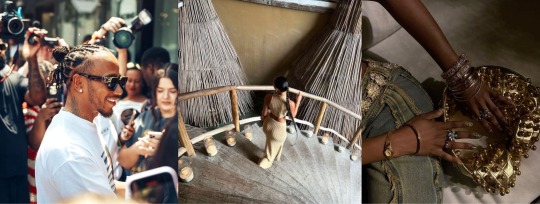
pairing: sir lewis hamilton x princess of zamunda!reader
summary: after many years, your father has left you to sort your love life out before you have to rule the kingdom. what you didn’t expect was to find love within your father’s favourite sport.
warnings: outfit links, smau, just read 🤭 (sorry for any typos!)
saint’s team radio 🎀: listen, i love ‘coming to america’ just as much as lewis and this being a 3 am thought made me too excited to write it. enjoy it, love ya! 🫵🏽💗
tags: @mauvecherie-writes @httpsserene @exotic-iris13 @motheroffae @purplelewlew @arshiyuh @alika-4466 @non-stop-imagines @hopefulromantic1 @vile-harlot @emjayewrites @yeea-nah @henneseyhoe @saturnville @greedyjudge2
pls like, comment and reblog!
fc: nomzamo mbatha

-
palaceofzamunda
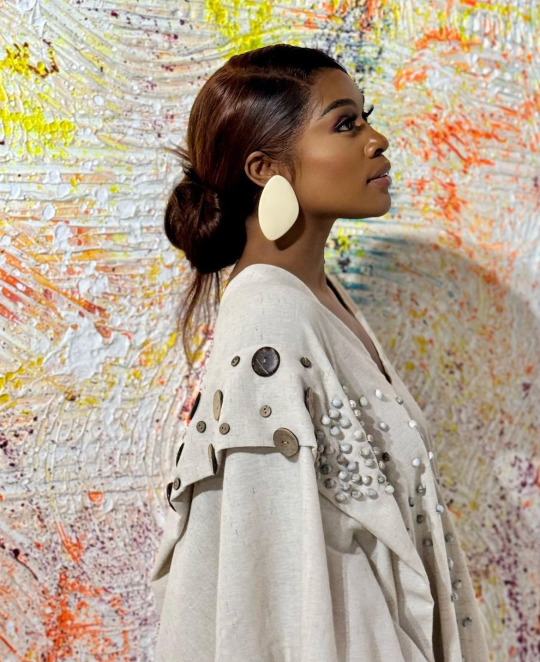
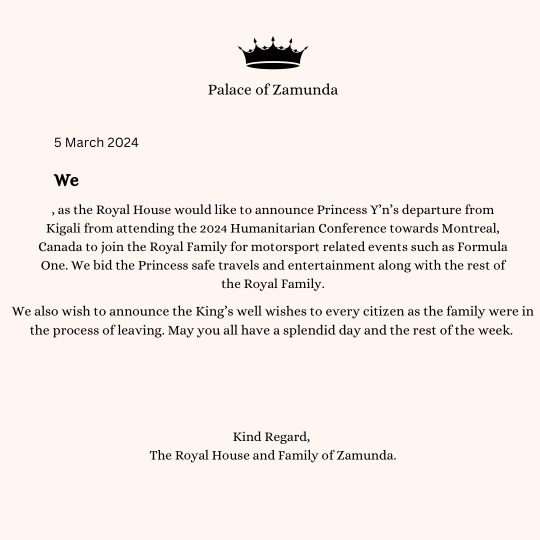
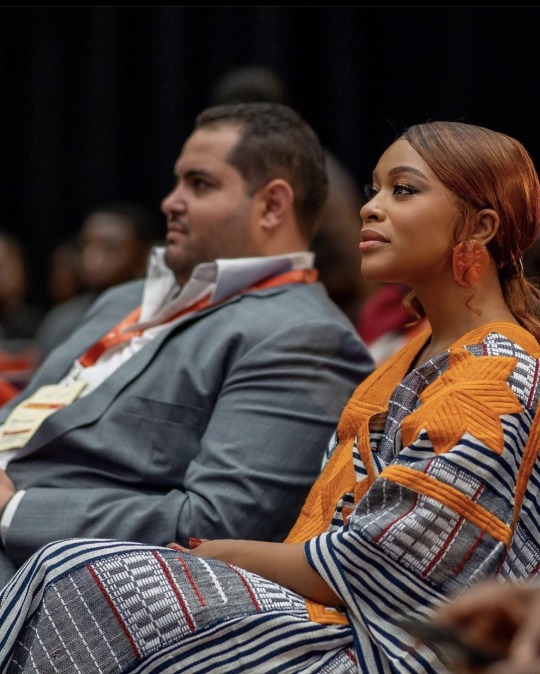
liked by f1, mercedesamgf1 and 574,356 others
palaceofzamunda Her Majesty Princess Y/n will safely depart from Kigali, Rwanda to Montreal, Canada with the rest of the Royal Family for a motorsport event per the King’s request. We wish them safe travels!
view limited comments
f1 very excited to host the royal family this weekend!
user i hope they will treat our glorious family well as the royalty they are
user princess y/n is so gorgeous
user so glad she gets to be our next queen
user sky sports and f1 have announced their arrival and have hyped it up so much…there’s levels to this kinda thing
user craziest thing is that they never say anything about prince harry or the prince of monaco whenever they’re there 😭
user i wonder which team the king supports
user fun fact our king loves ferrari but his fav drivers are 1644 and ofc other older drivers as well
user he’s just like the rest of us fr 😝
mercedesamgf1 extremely honoured to be hosting the Royal Family of Zamunda in our garage!
user i would risk it all for Princess Y/n
user it would be iconic if Princess Y/n gets together with a driver
user girl wdym, isn’t she married?
user no she isn’t, homegirl is extremely dedicated to her work as a humanitarian and as a country, we’d be surprised if she was romantically involved with anyone 😭
user what a woman
-
“Father, were the rose bearers necessary for the trip?” You huffed out, watching as rose petals were being tossed out on the tarmac before your father stepped out on the jet’s stairs.
“You know it is tradition, my child. Now, have you gathered everything before we leave this plane?” Your dad answered, waiting for you, your mother, and your sisters to exit the plane after him.
Holding onto your carry-on, the Canadian air breezed past you as you descended from the plane’s steps and gave the media a polite wave, wanting to get to the comfort of the hotel already. Given the warmest welcome from the airport staff, you and your family safely made your way to the official cars and drove to the Four Seasons.
Upon arrival, another warm welcome was given along with a bunch of staff issued to you at your every call and you did not want to say no as they kindly offered.
Laying down on the incredibly soft bed, you appreciated the aesthetics of your suite and took photos that you knew you couldn’t share with the public due to safety reasons so that just ruined the mood so to bring it up again, you called your royal advisor/childhood friend just to update her on your journey.
“And let me guess, the media was all over you guys.” Ama chuckled through the phone. “When aren’t they ever. A lot of them were from Baba’s thing we’re going to.” You said, rolling your eyes as you recalled the flashing lights from your landing.
“Oh, the formula thing. You’ll be fine, Y/n, just remember to interact with other human beings and don’t bring up work.” Ama spoke, squinting her eyes at you. “Don’t you have faith in me? I’ll be as chilled as I can be.” You said.
“Y/n my dear, should I remind you how you ran away from that one rapper because he wanted to take you out on a date?” She laughed in between her sentences and you wanted to scream in embarrassment. “Ama please, let’s not speak on that, it was enough to scar me for days.”
Holding her hands up, Ama spoke again. “Okay okay, I’m sorry. Look Y/n, I have to go now and I promise i won’t speak on it again.” She laughed once again and you just shook your head at her.
“Bye Ama, say hi to everyone back home for me.” You sighed out.
“Byeee! Don’t forget, listen to sexyy red before you go. She’ll give you confidence.” Ama winked then dropped the call.
Feeling your hunger slowly come back, you ultimately decided to drag your two younger sisters to get dinner with you. You knew the next day was going to be incredibly long so you wanted to do everything early to prepare yourself.
-
You made no effort to research a single thing about the sport that you were going to watch.
Your father had sent staff to hand deliver your passes to each of you, there were only two and had specified that it was from Mercedes. Luckily, they went very well with your outfit choice for qualifying that day.
As for your journey to the track, a clearly nervous Mercedes employee was assigned to you along with all the other members of your family having their own guide. Her first thought was to compliment you and you couldn’t have thanked her enough, with you starting to like the experience.
Sitting in the car was not awkward at all, you had asked several questions about the sport and what exactly was happening so that you would not be confused in the garage. A tour would be put in place before qualifying for your family then you’ll get to meet the drivers however most of the fun stuff will happen on Sunday.
“Tell me, is my skirt too short? I made a bold move with this outfit today.” You asked, the younger girl already shaking her head in disagreement.
“It’s a very cute outfit, Your Majesty. It’s quite unsuspecting unless you’re going to wear a sash.” Maddy joked. “Oh no, we stopped that practice three years ago. Another thing, you don’t have to call me that. Y/n is just fine.” You smiled and you could see her sigh out of relief.
The conversation had went on until you arrived to the paddock gates and quite the crowd had gathered and obviously they had to be for the drivers and other important f1 personnel. Maddy had informed you that you and your family would enter through a much more private entrance to avoid crowds.
As soon as the door was opened, you could hear the loud atmosphere of the track. From fans to the cars, it was buzzing and that had you looking forward to the rest of your trip. Following close behind, you could spot your parents and sisters walking slightly ahead of you and they were admiring the beauty of the scenes behind the sport.
However, the weather did not accommodate your outfit all with goosebumps rising on your skin so quickly. “We’ve got some hoodies in the hospitality.” Maddy reassured with a smile.
After a warm welcome upon arriving at the hospitality and the overly excited team principal had showed you around, you finally received the hoodie and completely unaware of the ‘44’ etched into the material but at least you were now warm.
Your father was at his happiest, over-explaining everything to your curious sisters and your mom was in deep conversations with the barista who was from Zamunda. The paddock club was lively with different people wearing colourful merchandise of their favourite teams and only then did you realize you hadn't seen any driver or their face even though they were planted everywhere.
Before you could pull out your phone to research, Khosi, the youngest, ran up to you whilst laughing. "I made a joke to Baba that you'd find someone here and the face he made was priceless." She wheezed out, plopping down on the couch you were sitting on and lightly smiled at her antics.
Looking over at your father, he couldn’t be more excited, his smile growing larger and larger as the Merc personnel continued speaking. “Toto will be here soon with the drivers and a few photographers from Mercedes. We’ll then head to the garage and pit lane for a tour.”
Without a moment to spare, several people entered the space including photographers, the very eager team principal and what you would assume were the drivers. The taller one walked in with his hands clasped together with a large smile on his face, his style could be described as preppy.
The next driver, however, his presence could be felt with just a step in the doorway. The first thing you noticed about him was his confidence followed by his outfit, a black tracksuit with simple red lines around specific areas. After being mesmerised by each detail about him, you got to his eyes which locked in with yours.
A shiver ran down your spine as the both of you maintained eye contact with each other, a slight smile on his face whilst chewing on some gum and you truly could’ve melted on the spot. “George, Lewis. Meet the royal family of Zamunda. King Akeem and his family have been long time followers of Formula One and we’ve had the honour of hosting them in our team.” Toto expressed, quite literally unable to stand still.
Introductions began and butterflies were flying around your stomach the closer you got to him. You could tell that he was your father’s favourite driver as he spoke for quite a while and even made a few jokes but you couldn’t hear anything, not when the man in the designer tracksuit was staring you down.
“Your Majesty, i’m Lewis. It’s lovely to meet you.” He finally introduced himself to you as you were the last of your family to greet everyone. You held out your hand to him and he gladly accepted it and you prayed that he wouldn’t feel the warmth of your palms. “Likewise,” You cleared your throat. “Y/n is just fine.”
The sound of your name falling from his lips felt like heaven, pronouncing it correctly on the first try just added to the attraction. “It’s a pleasure to meet you, Y/n.” He spoke lowly and you could barely keep yourself together in your head. You wanted to find more words to say to him, anything, but your chance fell short as the eager team principal pulled you out of your head to introduce the next driver to you.
The next few minutes were brutal. Your family stood opposite the faces of the team and you could feel his eyes glued to you, unmoving.
In typical Zamundan fashion, it’s in your father’s blood to brag about how great his country is and all its beauty. “And onto my eldest daughter, she’s quite the superstar. All her humanitarian work has brought eyes onto Zamunda. Y/n, aren’t you working on the STEM school project? She’s also a professor!” The King spoke with pride in his voice, making you want to hide in a corner.
A humble but nervous chuckle left your lips. “It was just a week of me teaching lectures, Baba.” Your words made the whole room laugh but his smile was the brightest. “But yes, the STEM project is still in its early days but a lot of students are interested which makes me happy.” You concluded with a small smile.
Lewis looked impressed. Wait. Since when did you care what anyone thought of your hard work? Especially a man that you knew would be a major distraction to the single lifestyle you’ve lived all these years. You had much to focus on and becoming Queen of Zamunda was at the top of your list.
But why not let loose a little? ‘Live a little��� as your sisters often say whenever you come back home exhausted.
“Is that so? Lewis here has his own foundation for kids in STEM, specifically for motorsport!” The tall team principal smiled and it took everything in you to look into the man’s eyes as you felt them on you.
“I could tell you more about it if you’d like.” Lewis spoke in a calm, low voice. You wanted to walk closer so that you could hear his words travel through you, wanting to listen to every word he had to say to you, every action he wanted to do to y-
Taking a breath and putting a soft smile on your face, you nodded. “I’d like that, thank you.” Talks of hot laps and tours started flying around but you couldn’t hear a word that was said. What was wrong with you? All this man had done was look into your eyes and you felt like you could melt. Lewis clearly used this gentlemanly charm to persuade everyone around him, including your father.
Watching him converse with your family had unleashed a new swarm of butterflies in your stomach, something you hadn’t truly felt in a long time. You had been with one or two people casually but none had ever satisfied you, only caring about your status as Princess. However, you had a gut feeling about something but you didn’t want to dwell on it yet.
“Shall we go for the tour now?” Toto’s voice boomed around the room with a clap of his hands.
-
Feeling a nudge on your arm, you turn to look at your mom as your attention was on the screens around the garage. “Are you going to bring him to Zamunda?” Your mother teased with a smile. Your eyebrows furrowed before you realised who she was referring to.
“Mother, I’d rather not talk about that now. Let’s just enjoy where we are now.” You put your hand on your mom’s then turned to look at the screen.
“He’d make a lovely prince. It’s okay to separate yourself from work, you know? I want you to live a little, my angel.” She continued, enveloping both her hands around yours.
You opened your mouth to speak but she beat you to it. “Don’t worry about your father. He’d be ecstatic if you brought this one home. You still have a lot of time left, Y/n.”
Knowing your mother was right, you breathed in and refocused your attention to qualifying. Lewis seemed to be doing well, even his driving looked attractive to you. Okay, calm it down girl.
After quali, the Mercedes hospitality was buzzing even though the skies were ever gray. Munching on a piece of cake, you offered a smile to those who would walk past and gawk at you. It was evident that F1 had made quite the big deal about your family merely attending a race weekend but you never expected this attention much on you.
A camera crew stayed outside and continuously took pictures of you sitting by your lonesome and you hoped for something to distract you from the feeling of being watched. Surprisingly, the crew began walking away after looking behind you for a split second and the cologne that suddenly surrounded you made it very clear who did it.
“Sorry if they were bothering you, your highness.” Lewis spoke, eventually standing in front of you yet not taking a seat across. Chuckling a bit, you looked up at him. “I thought we spoke about the title, Lewis.”
“Yes we did but I can’t let the media know you like that, only I’ve received the honour.” He smiled and there were the butterflies again. “If you’d like to sit down, you may.” You offered with the sweetest smile. Taking your offer, he never took his eyes off you.
It was quiet as he observed you. “What?” Looking like a deer in headlights, you placed your spoon down. “You’re a powerhouse. I’ve seen you represent your country and how much love you have for it. It’s admirable.”
You were taken aback. You hadn’t received such compliments from someone you were interested in. “Well, now I feel terrible because I’ve got no clue about your sport.” You spoke, covering your mouth with your floating hand.
“That’s okay, Princess.” All he did was say those words and you felt like a puddle all over again. “You’re doing that thing with your eyes again.” You pointed out, wondering if he could see right through your demeanour.
“What thing are my eyes doing, Y/n?”
“…I’d rather not say it in public.”
Lewis’ smirk widened as you said that. He thought it would be a challenge to try make a move on you as you seemed reserved unlike the rest of your family. “Why not? I’m quite curious to hear your thoughts.” He smiled, adjusting his arms to rest on the table.
“Not in your team’s hospitality suite.” You quickly replied, your eyes darting everywhere but him.
“Y/n.” Lewis just said your name and just like that, your thoughts became improper. Locking eyes with him, you knew that he was teasing you, something that you were never able to experience others.
“We can speak about our foundations over dinner!” You quickly suggested, barely registering what just came out of your mouth. “Dinner sounds perfect however that was supposed to be my line.” He joked and you couldn’t help but laugh.
-
Everything felt chaotic. You had returned to the hotel from the race which was extremely exhilarating and he had gotten a relatively high position which made you proud.
As you were leaving your seat in the garage a few hours ago, Lewis had approached you knowing very well that the cameras were watching the exchange between the two of you. “I forgot to mention how gorgeous you looked earlier.” He said as he was standing relatively close to you.
“Lewis! You can’t say that, the cameras are watching.” You whisper yelled, looking at the cameras pointed at the scene before them. All he did was laugh and turn on his heel before turning his head to you. “I’ll see you at 7 pm , your highness.” He winked and just like that, he was gone.
And that whole memory ran through your mind as you paced up and down your hotel room. You were all ready for the dinner but you were feeling something…different. It was normal for you to have dinners but this one had a certain tension hanging over it. You smoothed out your dress with your hands as you paced.
Another thing that drove you crazy was that you had no clue of what exactly was happening. You always knew the time, setting and guests of everything you did but now you were completely out of the loop but you had trust in him, as insane as it sounds.
The knock on your door pulled you out of your thoughts and you took a breath before turning the doorknob to reveal Lewis standing there with a bouquet of flowers you couldn’t recognise but your heart grew at the sight of them. Your eyes glided over him as you looked at his outfit, a white cardigan with black slacks and designer chunky shoes. He smiled and you almost fell to your knees just looking at him more relaxed and sexy.
“You look absolutely beautiful, Y/n.” He complimented, his own eyes moving all over your body. He couldn’t help but admire your beauty as you stood before him. You were the embodiment of a princess and you never failed to exude such energy as you did.
“Uh, would you like to come in? I just have to get my heels.” You spoke as you opened the door a little wider. The room smelt of a scent he couldn’t quite grasp but he definitely labelled it as an aphrodisiac because Lewis began feeling his hands getting hot. He made his way to the couch right by the large window as you closed the door.
You stood in the middle of the room with your fingers pinching your lip in nervousness. The tension could be cut with a knife with the way he was watching you. “Um so, how’d you plan this?” You asked, finally looking at Lewis but you noticed his eyes were slightly lower.
“Your sisters are quite the wingwomen.” He spoke, adjusting his body to sit comfortably.
“Right, right……”
A beat passed before he leaned forward. “Princess, is everything okay?”
“Do you think we could skip dinner? I never usually do this but I don’t think I can go another moment.” You blurted out, too afraid to see his reaction to your raunchy suggestion.
Another moment of silence passed and you felt defeated. You felt like you’d gone on too strong and that’s not what you envisioned at all.
“Y/n.” He called and you picked your head up to look up.
“C’mere.”

saint’s notes: you thought I was going to give you smut???? no 🤭 hope you enjoyed though! 🫶🏽
#☆ ‧₊˚ saint’s media pen#saint writes#lewis hamilton x black reader#lewis hamilton fanfics#lewis hamilton imagine#lewis hamilton x oc#lewis hamilton fanfic#lewis hamilton fic#lewis hamilton x reader#f1 x black!reader#f1 imagines#f1 x reader#f1 x you#f1 imagine#f1 fic#f1 fanfic#formula one x black reader#formula one x reader#formula 1 x black!reader#formula 1 fanfic
574 notes
·
View notes
Text
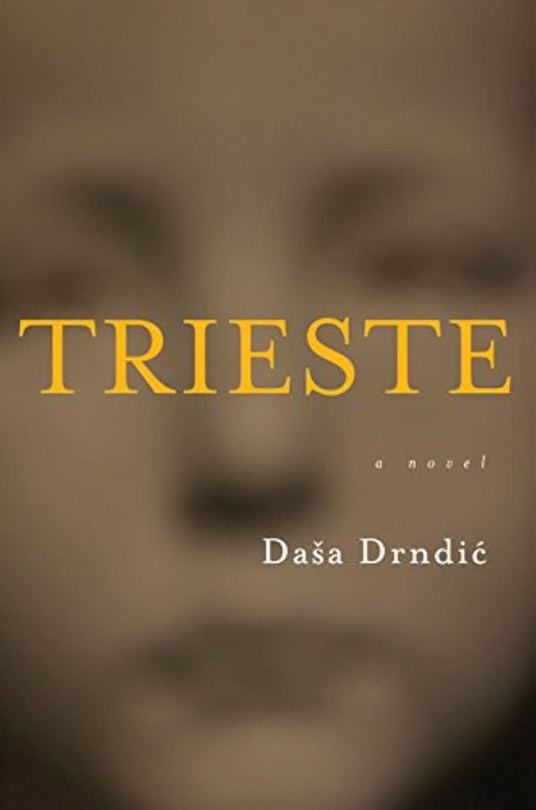
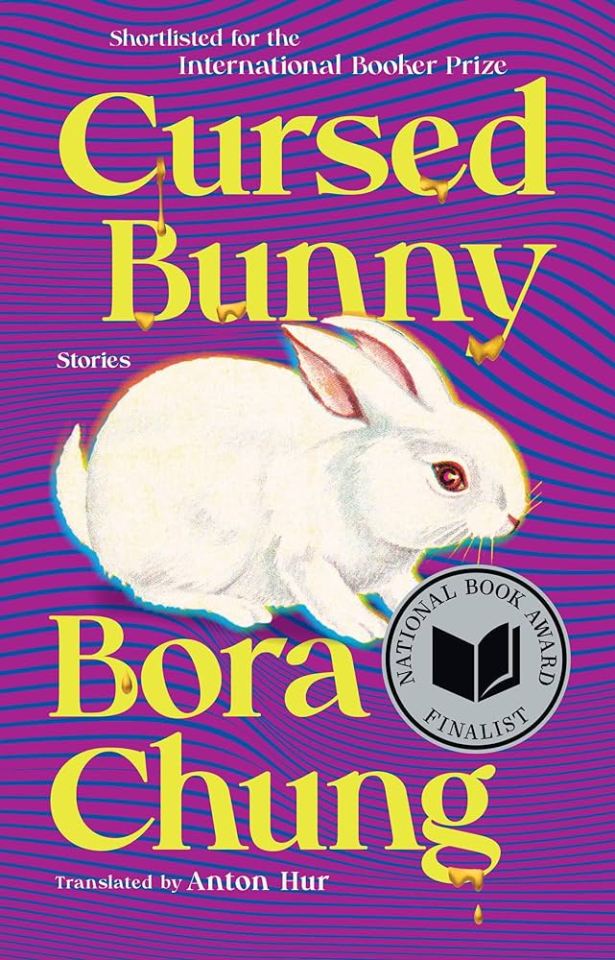
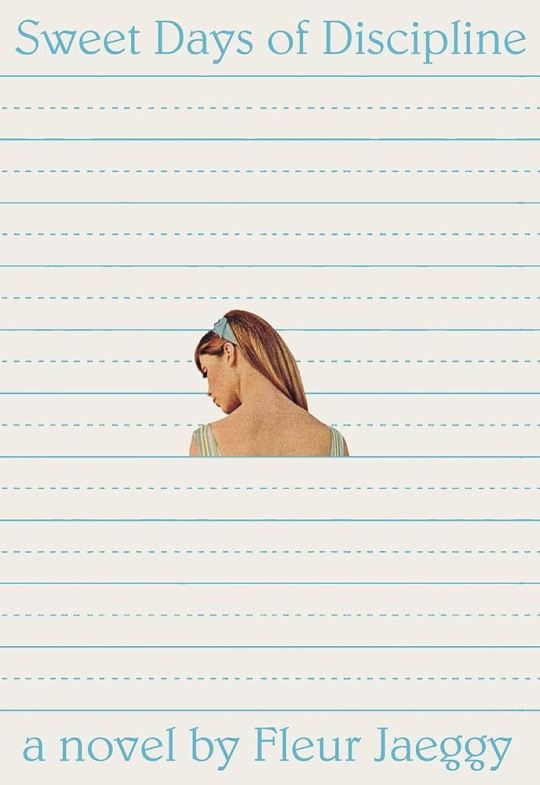
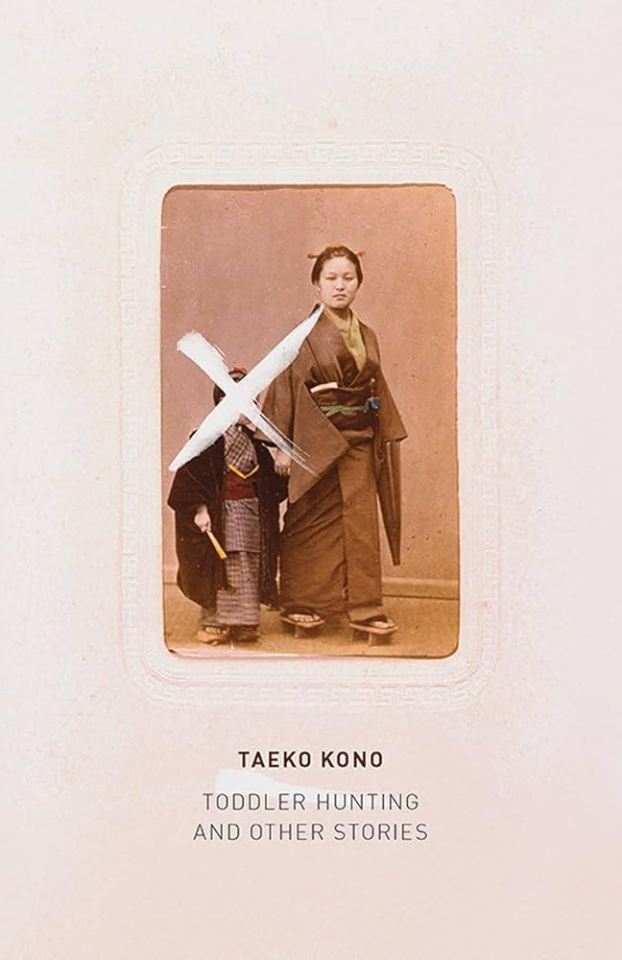
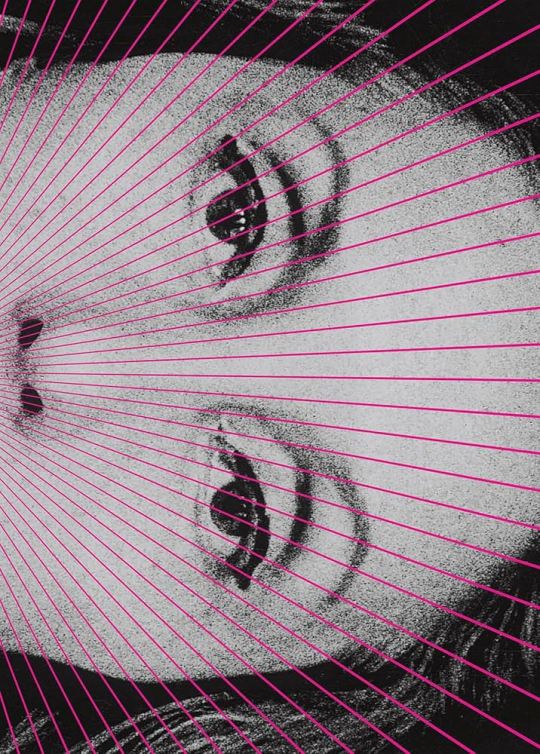
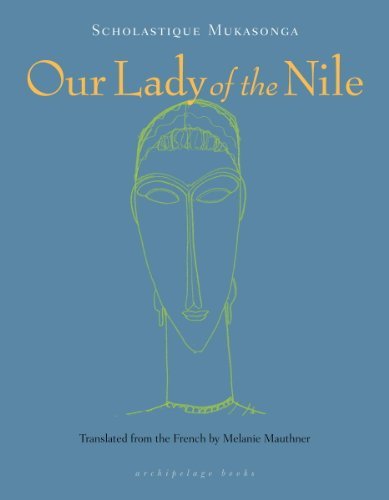

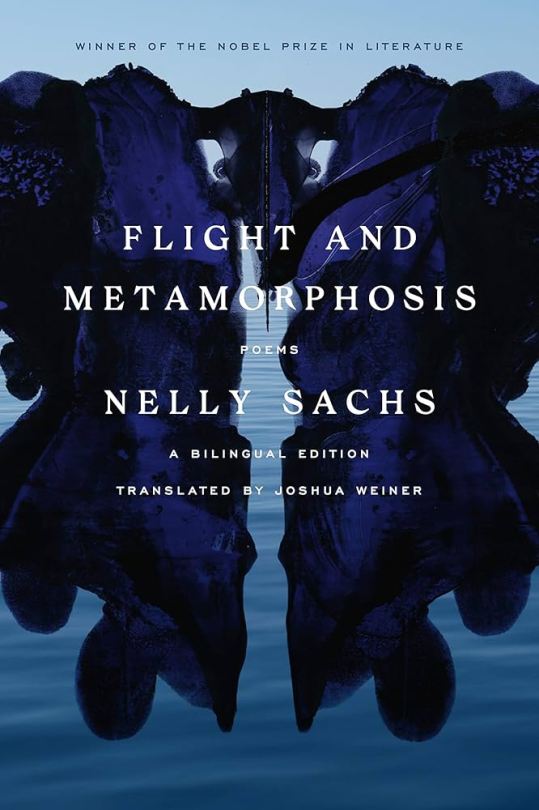
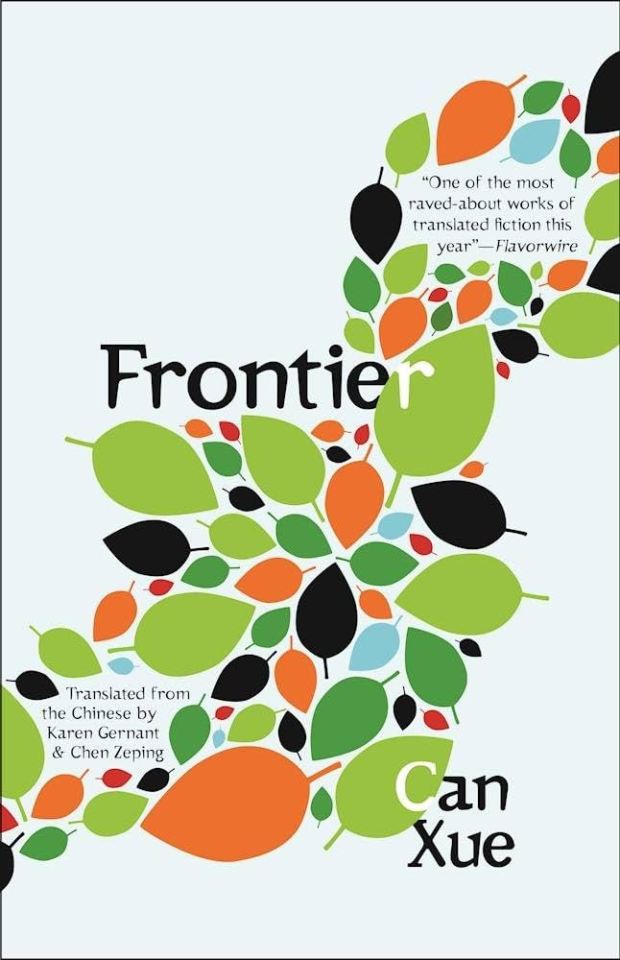
Hi friends! Inspired by @librarycards I wanted to make a post celebrating Women in Translation Month! Anglophone readers generally pay embarrassingly little attention to works in other languages, and that's even more true when it comes to literature by women, so I will jump at any chance to promote my faves 🥰 Here are some recs from 9 different languages! Also, I wrote this on my phone, so apologies for any typos or errors!
1. Trieste by Daša Drndić, trans. Ellen Elias-Bursać (Croatian): An all-time favorite. Much of Drndić's work interrogates the legacy of atrocities in Europe, particularly eastern Europe. Trieste is a haunting contemplative novel centered on an elderly Italian Jewish woman whose family converted to Catholicism during the Mussolini era and were complicit in the fascist violence surrounding them in order to protect themselves.
2. Cursed Bunny by Bora Chung, trans. Anton Hur (Korean): A collection of short stories that are difficult to classify by genre–speculative fiction in the broadest sense. The first story is about a monster in a woman's toilet, which sounds impossible to pull off in a serious, thought-provoking manner, but Chung does so easily—these are the kind of stories that are hard to explain the brilliance of secondhand.
3. Sweet Days of Discipline by Fleur Jaeggy, trans. Tim Parks (Italian; Jaeggy is Swiss): Another all time favorite! The cold, sterile homoerotic girls' boarding school novella of your dreams.
4. Toddler-Hunting and Other Stories by Taeko Kono, trans. Lucy North (Japanese): I think I read this in one sitting. Incredibly unsettling—these stories will stay with you. They often focus on the unspoken psychosexual fantasies underscoring mundane daily life.
5. The Complete Stories by Clarice Lispector, trans. Katrina Dodson (Brazilian Portuguese): I think Lispector is the best known writer here, so she might not need much of an introduction. But what a legend! And this collection is so diverse—it's fascinating to see the evolution of Lispector's work.
6. Our Lady of the Nile by Scholastique Mukasonga, trans. Melanie L. Mauthner (French; Mukasonga is Rwandan): Give her the Nobel! Mukasonga's books, at least the ones available in English, are generally quite short but so impactful. Our Lady of the Nile is a collection of interrelated short stories set at a Catholic girls' boarding school in Rwanda in the years before the Rwandan genocide. These stories are fascinating on many levels, but perhaps the most haunting element is seeing how ethnic hatred intensifies over time—none of these girls would consider themselves particularly hateful or prejudiced, but they easily justify atrocities in the end.
7. Extracting the Stone of Madness: Poems 1962-1972 by Alejandra Pizarnik, trans. Yvette Siegert (Spanish; Pizarnik was Argentinian): Does anyone remember when my url was @/pizarnikpdf... probably not but worth mentioning to emphasize how much I love her <3 Reading Pizarnik is so revelatory for me; she articulates things I didn't even realize I felt until I read her words.
8. Flight and Metamorphosis: Poems by Nelly Sachs, trans. Joshua Weiner (German): Sachs actually won the Nobel in the 1960s, so it's surprising that she's not better known in the Anglosphere. Her poems are cryptic and surreal, yet deeply evocative. Worth mentioning that this volume is bilingual, so you can read the original German too if you're interested.
9. Frontier by Can Xue, trans. Karen Gernant and Chen Zeping (Chinese): Can Xue is another difficult-to-classify writer in terms of genre. Her short stories are often very abstract and can be puzzling at first. I think Frontier is a great place to start with her because these stories are interconnected, which makes them a bit more accessible.
85 notes
·
View notes
Text
Yes, he does, as it's just the truth, that I have explained since 2 018 here.
The mainstream media have once again repeated blatant stupidities, instead of reading me or other right sources. The start is the situation of the oblasts of the South-East of Ukraine, included Donbass which was the main point of war since 2 014.
The oblasts are regions. As in Spain, it's quite equivalent. The ones I'm speaking about are in favor of Russia, and Russian speakers, the language that they have chosen. They consider themselves Russian, but have been administratively made Ukrainian after the end of USSR.
They have been slaughtered in the media indifference except Russian, and some of those oblasts. The slaughters have included many women and children.
Putin, after a lull of several years, has been forced by the restart of the attacks against those populations, to come and help them with his troops. The Western and a part of the Ukrainian media called this "Nazi invasion".
There are other things, of which I already spoke. I'm tired of repeating over and over. I spoke here twice in the last months of what has been found recently in Ukraine. Hundreds of caged children, starving, tortured. Masses had been killed in paedo-satanist rituals. THINK. I'm really tired of seeing you repeating the most stupid lies of criminal media and politicians. This ABC one is a blatant manipulation as there's no "threat". It means that if Zelensky keeps on, his attitude will destroy Ukraine, which is already unfortunately "well started" with huge war losses in all terms.
The Ukraine/Russia case is equivalent to the Palestine/Israel one, to the Algeria/France one, and even to the Rwanda one, even if in this case, the Hutu riposte was an obvious barbarian genocide (1 994), and you may remember that I spoke about it in French one week ago (link in comment), as the Tutsi president Kagame who lived the genocide and what really started it (the previous war between both parts) is really making a fuss in RDCongo, in an obvious invading attitude. Geopolitics are NOT a game, and there are specialists of it. These fucking media are NOT some of them.
Muy buenas tardes.
Basile Pesso, 21 February 2 025 (Fb) With a screenshot of an ABC article
2 notes
·
View notes
Text
The Queen's speech at The Queen’s Commonwealth Essay Competition 2023
Ladies and gentlemen, it is a huge pleasure to welcome you to Buckingham Palace today to congratulate and thank all of you who have been part of this year’s Queen’s Commonwealth Essay Competition - and to celebrate the Competition’s 140th birthday.
Remarkably, the QCEC is the world’s oldest international writing competition for schools. For 14 decades, it has given young people the opportunity to express themselves on the issues that matter most, bringing communities across the Commonwealth closer together.
The Competition, as Gyles [Brandreth] has told us, was launched during the reign of Queen Victoria: herself a published author and a passionate lover of literature. We know from her diaries and letters that she was particularly fond of the works of many authors, including Jane Austen, Lord Tennyson, Charles Dickens, Charlotte Bronte and Lewis Carroll. Legend has it that, having admired “Alice in Wonderland”, the Queen wrote to Lewis Carroll to request first editions of any of his other books. By return of post she received a copy of his “Syllabus of Plane Algebraic Geometry”. Probably not what she was after!!
But back to the authors in this room! Well done to each and every one of you – you are quite brilliant and I have, as ever, enormously enjoyed reading your entries. Always remember that you are in impressive company - past entrants to this Competition have gone on to become teachers, doctors, lawyers, novelists, journalists and even, in one case, a Prime Minister! I shall be following all your achievements and adventures with the greatest possible interest.
The QCEC has a wonderful history. Yet this year’s topic, “A Youth-Powered Commonwealth”, reminds us that your future will be even better, as the next generation takes up the baton of using the written word to promote and unite our worldwide family.
In the last decade alone, more than 140,000 young people have entered the Competition. On my travels, I have been lucky enough to meet entrants in Ghana, St Vincent and the Grenadines, New Zealand, the Gambia, Malaysia, Rwanda, the United Kingdom and, earlier this month, Kenya. In a library in central Nairobi two weeks ago, I was delighted to be reunited with the 2021 Senior Winner, Kayla Bosire, whom I had last seen two years ago at the Awards Ceremony here at Buckingham Palace. In her winning essay, she wrote a strikingly beautiful paragraph that has stayed with me since, as it underlines the value of our Commonwealth and that of the QCEC:
“The Commonwealth, among other associations, had one goal: peace and security. And when they tossed their differences aside and joined hands - when they looked past one’s beliefs or the colour of their skin - they achieved it. Together. They advanced and progressed together”.
So, ladies and gentlemen, let us advance and progress together towards the next 140 years of the amazing Queen’s Commonwealth Essay Competition!
18 notes
·
View notes
Text
I'll try to be brief and avoid rambling as I like to do lol.
So, I was on twitter for something else and then saw in my lil "what's happening" that "Tutsi" was trending and so it got my attention right away and so I clicked it and saw that it was #Kwibuka30. So then it kinda brought alot of thoughts that I've had for about the past week or so rush straight to the front of my brain.
Its #Kwibuka30, and its essentially a day of remembrance of the 1994 Genocide in Rwanda. Its a day that I don't particularly think about often but I think of that year and period as a whole more often. Its kinda two fold where as in the past I didn't know of it (the specific day not the cause) and now that I have actively chosen to learn, read and fully immerse myself in it vs. just listening to convos and stories through my family members. I'm also close to the end of a book "Do Not Disturb" by Michela Wrong that is focused on the murder of a former high ranking RPF (Rwandan Patriotic Front) member but for me touches on the subject of the things that contributed to and reaction of the '94 genocide. Other books I finished that also touch on the subject. With that I also am a smarter & more informed just based on who I was around and listening to and I'm older, better educated (more educated??) anyways. I saw all that to get to this bit that made me feel like putting this and these thoughts out (so I can come back to and see).
I was personally affected by the '94 genocide and my family as a whole was affected by it. My life would be completely different if what led to it and it happening never happened. So I feel a certain level of pain/hurt when I think of the number of uncles I never got to meet, or cousins I didn't get to know.. I feel for my mom who lost brothers, uncles, friends & my grandma who lost her kids, siblings, nieces/nephews, etc. So it does that to me and to those who I have no relation with I think of more now than then because no one deserves to lose their life like that esp. innocent people who knew nothing and were taken. Its political and a longstanding thing that folks were gonna get their lick back but damn. Knowing now what I know I think its important to clarify that if this were to ever be seen by a person who.. idk just wants to start something or call me or consider me a génocidaire (genocide denier... in french for a reason) for what I'm about to say.. its actually far from it.
I understand that #Kwibuka30 is more or less reserved for "commemoration of the 1994 Genocide Against the Tutsi" I believe its also important that families of innocent Hutus should also be taken into consideration and remembered. Because the bigger play here is fully political in how its handled but its inhumane (to me) to make people feel less than or not be allowed to openly mourn for there own because others who did something so horrific shared the same tribe and that means they don't deserve the same sympathy... fuck that because its not fair. So as I think about my family and everyone who was affected. God Bless to all the lost souls that died, survived and many who feel guilty for being around. I pray for yall & hope you find a second to mourn, celebrate and feel free even if its just for a second.
--------------------------------------------------------------------------
This takes me to Gaza & the Palestinian people because it was for them who made me relive things that happened more so when i was younger and knew nothing. I'm glad I was able to get off what I needed in the first part but this was more due to the images I was seeing. I feel for all those impacted by what's happening because at one point that was my reality, and I listen to the people in my family and close friends talk about the periods where we were on the move from refugee camp to refugee camp, walking for ages, just the blur of it all. Its brings you down but my mom and I have convos about it and I see why our bond is so strong and we struggled together to get to where we are. My dad too! Out there put in the frontlines and making it back to check on me or having his men guard where I laid my head in many cases. Owing the chance I got to my uncle who was also in the military like my dad and he & his wife protecting my mom and I and so many stories where God was there for me and mine. Lucky to make it out fr. So I see the images of kids eating, playing, in their parents arms and I feel and get a jolt of emotion that reminds me I was once just like them. So how its imperative to show love, give, pray and what I can to help. Life is unpredictable and my heart goes out to each and everyone impacted by it all.
Idk man.. I had to get that one off my chest and put it somewhere.
3 notes
·
View notes
Text
Real talk this is fucking insane. I know it goes without saying at this point but goddamn does our education system need an overhaul and academic dishonesty is just the tip of the fucking iceberg. The sad thing is is that people, not just kids, will put in the effort to do things that they like and find interesting. Our brains are hard wired to close in on subjects that we genuinely have interest in and we will do things regarding those subjects and utilize that knowledge fullheartedly. To say that some if not most subjects in academia can be full on dropped should not be news to some, because let's be honest with ourselves most courses offer knowledge that only applies to specific career goals.
Math courses past basic algebra have no real world application for most people unless you want to be an engineer or go into the sciences.
Literature offers nothing outside to writers and critics. If anything forcing kids to read will make them adults who resent reading instead of inspiring people to actually read. I know media literacy isn't the best but I can tell you that making me read Hamlet has done very little outside of making me chuckle at that Adventure Time episode after reading it 10 years ago.
Now I will concede that subjects like history and the basic sciences are absolutely a necessity, and I don't feel like I need to justify that standpoint, especially anatomy because goddamn the gross ignorance shown towards human anatomy online is just appalling. However our approach to these subjects (history in particular for US students) needs serious review and revision.
The amount of times we went over just US history in public school is fucking insane. I'm willing to bet most people in the US didn't know that the Portuguese Navy was the most powerful military force in the world for a good majority of human history, or that the British Empire were the largest drug traffickers in the world, or Hell even the East India Trade Company was legitimately a thing. Seriously we need to get our head out of our own asses with History because fuck me you can only go over the same shit so many times.
(Not to say that we, at least in my school district, didn't go over some world history, but most of it was in regards to WWII. We also went over the Rwanda conflict for... reasons? in middle school but for the life of me I can't recall why? Not to say that it wasn't an important topic but genuinely why did we go over just Rwanda? Was it a BHM thing? I also remember talking about Nelson Mandela, so was it just BHM?)
Of course most US history courses end around the 60's because why update the curriculum with recent history like how Nixon fucked us over economically. And some wonder why we vote celebrities into office even though it was a demonstrably bad idea.
Now I know that the same argument for math can be made for science but I'm going to argue tooth and nail that a basic understanding of science is way the fuck more important than any understanding of math for the average person. A layman's comprehension of anatomy will always trump a full understanding of quadratics and I would love to hear any and all opposition.
TL:DR Our education system, at least in the US, is fucked and we need to work our asses on that. Now.
2 notes
·
View notes
Text
With everything happening in Israel and cause October is banned book month I wanted to recommend that you guys check out the book All The Rivers by Dorit Rabinyan. All The Rivers is the English translation of an Israeli novel called Borderlife that has -- as far as I know -- been banned in Israel.
The book is about two expats, Liat and Hilmi living in New York City. Liat is an Israeli translator studying to finish her degree and Hilmi is a Palestinian artist living in Brooklyn on a visa. The two of them fall for each other after a chance encounter and thus begins a story of tragic, star crossed lovers in the same vein of Shakespeare's Romeo & Juliet. The story is deeply political and the characters are infuriating, but it begs us to question the notions of patriotism, political propaganda, and ethnocentrism.
Ethnocentrism is the hatred of a group of people because of religious or cultural reasons, regardless of their race. Liat and Hilmi's story is an example of that. Real world examples include tragedies like the Hotel Rwanda incident in South Africa or the Japanese dictator Hirohito Tojo's attempted colonization and genocide against citizens of China and much of Asia in World War II or the cultural genocide against the Irish carried out by the British during the potato famine. There are stories of things like this happening all over the world, all throughout history.
It's important that we read these things so that we can develop a greater sense of empathy for people different from ourselves. You can read more about the book and the author's story here.
#books#books books books#banned books#bookworm#bibliophile#israel#palestine#bipoc reads#bipoc representation#book nerd#support bipoc authors#history#global history
3 notes
·
View notes
Text
So recent events reminded me of a discussion in an online forum I remember reading many years ago (yes, there I go again), essentially debating whether the West's post-WWII moral commitment is to oppose genocide as a whole, or to oppose particular genocide attempts.
A little less vaguely, it began with one person arguing that the West's woefully insufficient level of intervention in Rwanda constituted a failure to live up to our post-WWII "never again" ideals. The other replied that they didn't see how, as the Rwandan genocide and "never again" have nothing at all to do with each other.
Well, the first person incredulously asked just how one could come to that position. The second seemed confused how it wasn't obvious — there weren't any Jews being targeted in Rwanda, hence the West had no duty or reason to try stopping the genocide.
3 notes
·
View notes
Text
dramaturgs are literally an oppressed minority i just remembered this one time a director sought me out to do a play about marie antoinette because they knew i speak french and then while i was putting my material together, the stage manager sent out a google doc of the french words in the play with links to auto generated text to speech youtube pronunciation videos and then this other time i did a play set in rwanda and halfway through rehearsals the assistant director passed out a glossary they wrote of the french words, an idea which i also had and which i had included in the actor packet i handed out at the first table read lmfaooooooo
#these were all college productions so im not that mad actually#my first professional gig was more professional lol i was straightup asked “pls explain the cause of the korean war” in a rehearsal report
3 notes
·
View notes
Text
So, yeah, that happened.
I just got done dealing with a few years of chaos. What is unique about our globalized era is that having written that, I know that I don't even have to tell you why. Whether you were in Illinois, or Germany, or Rwanda or Tibet wouldn't matter that much. If you were human and you were living on this planet, you got to experience the chaos, too. There might have been questions about how necessary it all was, or how best to deal with it, but it was a universal human experience. Yet, we have people on the staff at Tumblr acting as if it were not, and as if there could no possible concern in our lives that would have taken priority over their corporate desire for engagement. I wrote about this, just now, on what was supposed to be something other than a microblog.
Physically speaking, I could post essays, here. Tumblr is not Twitter. The functionality is vastly greater, a fact that would have made a decisive difference, if only we (as Tumblr users) could trust the staff that is supposedly here to help us. But we can't.
I have eyes. Even if I had never read even a single comment about the recent changes on this site, I'd be able to take one look at two pointlessly vandalized blogs, and immediately know that something very wrong was going on. But, in fact, I have read the news, and seen the accounts of users who were shocked to lose years worth of writing, after their Tumblr accounts were ended without cause. Notice how I steered my way clear of the T word? I'm sure somebody has set up a filter that looks for it.
Appeals have been getting stonewalled. When I look at the same of the group hearing those appeals on Tumblr, and compare it to the name of the now scandal-ridden board that Twitter entrusted with the same job, and remember that other group enjoys the infamy it does, I find that I am not surprised to hear about the horrible ways in which my fellow users are being treated. On a hunch, I did a search and sure enough, right after Musk fired the people who had so abused their power at Twitter, the CEO of Automattic announced his intention of opening the doors for them, while expressing a hope that they would boost his company's profits tenfold.
So much to unpack, there, but the most important message is a clear one: Automattic doesn't respect its users. It does not and it will not understand that the content we put on its servers is the reason for those profits. That should be at least a little humbling for them, as thoughts go, and that, perhaps, is why they are so determined to not entertain it, that they're persist in doing that which will bring about their own bankruptcy, sooner or later. They want to believe that they're the best and brightest and most important people on Earth, so brilliant that they could never need nor even benefit from what others have lent them.
There is no reasoning with people who think like that. To those who lost years worth of writing and memories to some anonymous T & S guy's power flex, I am sincerely sorry for your loss. Please don't think that I'm victim blaming. But we all need to learn from these bad experiences, if we are not to doom ourselves to their endless repetition. The Tumblr staff is what it is, and what it is, is something that really isn't rare in San Francisco and hasn't been for a long time. We need to stop trusting Tumblr. That much, I think we can all see. But we need to stop thinking in terms of leaving the "bad" sites and finding our way to the "good" ones.
Tumblr used to be famous for being one of the good ones, and not so long ago, didn't it? This didn't keep it from turning into something evil in the relative blink of an eye. Look at the competition, and notice the way in which almost all of it is in the same area. That lack of geographical diversity, in combination with the lack of governmental regulation, is a clear sign of future trouble to come. Any site you move to, to get away from some power mad admin, could be the place that hires him, tomorrow. One can't deal with problems by walking away from them, when the people causing them can just walk after one.
Ever been to San Francisco? You can cross the place on foot at your leisure and be back well before sunset. It's that small. The people at these companies are running into each other in person. They're not strangers. Ever been to a corrupt, cliquish small town before? SF is an overgrown version of one of those. You're not going to get fairness out of its residents, or anything resembling impartiality.
All that we can do is limit the opportunities that these people have to inflict losses on us. We all need to back up out content offline, both as hard copy and in some durable format (perhaps burned to CDs), and to not invest so much time in our blogs, that we feel the need to cry when they're wiped out. The only thing that one should upload to the Internet is a sample of one's work, that much and no more.
The real world has more than a few people in it who will earn and go on living up to one's trust, so why go on bouncing from betrayal to betrayal? San Francisco was an infamous tourist trap before the Internet was invented, never really know for having trustworthy residents, so I have to wonder why any of us ever trusted the dot coms in the first place. I'm not trying to shame or mock you, if you did. How could I, when I've made that mistake, myself? But let's see our mistakes for what they were, understand them as well as we can, and move on to better things.
The arts and sciences existed long before the Internet did. We don't need the Internet to share the things we create with those who will appreciate it.
0 notes
Text
DAILY SCRIPTURE READINGS (DSR) 📚 Group, Wed Oct 22nd, 2024 ... DSR PILGRIMAGES
TESTIMONIES OF KIBEHO
Going with our DSR GROUP PILGRIMAGE to Kibeho last March 2024, JONESE NASAMBU MUKHWANA shares her testimony verbatim below:
START ...
"I take this opportunity to thank you Mr. Charles and the entire team of Namugongo Shrine parish for welcoming us to join you to Kibeho Rwanda. It was my first time to go for a pilgrimage, I experienced a lot and through the intercention Mary mother of Jesus God has answered my prayer.
1. My daughter had a problem of constipation she is healed
2. I did not have peace with my spouse but God has brought peace in my house through the intercention of Mother of the word
3. I have grown in Christianity, in prayers, in faith of which I have been commissioned to Catholic Women Association
4. My young sister Sarah didn't have a stable job and now God has blessed her with a new job
5. I also pray through Mother Mary to God just bring peace in our family, between my father and his son's and also among the siblings and God has answered my prayers.
Those were intentions that I present to Nyina wa Jambo at Kibeho and I learned and gotten a lot of blessings thank you and God bless you."
END ...
■ Share your testimonies and JOIN our Next DSR GROUP Pilgrimage to "Our Lady Of Kibeho", Nov 27th-30th, 2024: +256751540524@CharlesOngole. Remember Psalm 66:16 says, "Come and hear, all you who fear God, and I will tell what he has done for my soul."
Pray, Repent and Convert your hearts whilst there is yet time!
***
Charles Ongole John
Group Administrator/
Pilgrimage Coordinator - DAILY SCRIPTURE READINGS 📚 GROUP
NAMUGONGO
0 notes
Text

12/52 “Africa is not a country” - A review
Is Africa a country?
This week, because I’m tired, something a bit different.
I’ve delegated my work to ChatGPT, but because I have my pride, I’m going to interject with my real, actual considerations.
Write a review of the book "Africa is not a country", by Dipo Faloyin. Pick out strengths and weaknesses
Hmm. I think I have more to say than that.
"Africa is Not a Country" by Dipo Faloyin presents itself as a significant contribution to the contemporary discourse on Africa, challenging the monolithic and often oversimplified perceptions of the continent. Through a blend of humor, critical analysis, and storytelling, Faloyin offers a mosaic of narratives that illuminate the diversity, complexity, and richness of the 54 countries that comprise Africa
Something that surprised me about this book is how it made Africa feel real, for lack of a better word.
There wasn’t much in the book that surprised me - after all, the basic news of civil wars, famines and colonialism is common knowledge - but it gave a face to the names, in a sense.
It’s one thing to hear about how borders made of straight lines are harmful - another to understand that in the few cases where African countries (see Somaliland) they come closest to flourishing.
Diversity of Perspectives: One of the book's most significant strengths is its commitment to showcasing the diverse cultures, histories, and peoples of Africa. Faloyin takes the reader on a journey across various countries, offering insights into their unique challenges, achievements, and historical contexts.
The book is divided into sections (colonialism, media portrayal, history, etc.) and a very interesting section was the one on dictators.
Paul Kagame is a figure I was marginally aware of, ever since a video on youtube made me aware that Rwanda has blood drones (they’re really cool! I wish western hospital had such cool things going on!), but skimming his wikipedia page had made me think he was a lot more democratic than he really was.
Still low-key a person worthy(?) of admiration perhaps - Rwanda is a country that this book made me wish to visit.
Challenges Stereotypes: Faloyin boldly addresses and challenges the stereotypes and misconceptions that have long plagued perceptions of Africa. By highlighting the continent's achievements and potential, alongside its challenges, he offers a more balanced and fair portrayal, contributing positively to changing narratives around Africa.
Nigeria has a huge film industry! Who knew!
It’s called Nollywood, and I really want to watch some of its films now.
Third film industry in the world, apparently 🤔
I’m also quite happy that this book made me learn what Jollof rice is - and how not to cook it.
(It’s a rice dish that a lot of west african countries claim as their very own traditional dish - and of course the author can’t help but let us know that the version from his country is the best).
Perhaps because I listened to this book as an audiobook instead of reading it physically I struggle to remember much of it - but my impression was positive.
It was a breezy, enjoyable read.
0 notes
Text
Another thing to add:
To those saying "this is a hollow victory, Labour is just as bad as the tories", understand two things:
Labour is not as bad as the CURRENT tories. Yes, they're probably on the same level as the tories-as-led-by David Cameron. They are not as bad as the current shitshow of incompetent and entitled morons who are left in the party after so many abandoned it post-brexit (case in point: Labour is at least abandoning that much hated Rwanda Plan)
Labour is going to be easier to fight against. Keir Starmer is a piece of shit, but he's more likely to listen to/bend to the pressure of folks on the left than any of the tories would be. On top of that, Labour has some actually moral MPs among its ranks who also have more of a say in government now. The tories would gain literally nothing from compromising with people who would never ever vote for them, but Labour would. Also, reminder that Labour is funded by the Unions. While I'll always recommend joining a union, especially do so now that the government is a HELL of a lot more likely to listen.
To any americans reading this, yes there are some differences here. For starters, the Republican Party is more evil than the Tories and has been for some time. I say this as an absolute Tory-Hater, the tories still aren't as mind blowingly evil as the GOP. The split between the republicans and the democrats seems a LOT wider than the split between the Tories and Labour.
But the rest remains true. Convincing Biden to move leftwards would be a LOT easier than convincing Trump. Going up against bad democratic policies will be a LOT easier than going up against bad republican policies. And whatever your thoughts on Biden, he is not the entire party. I refuse to believe there's not at least one senator or whatever in the democrats that has good policies. There's certainly a LOT more than there are in the GOP
Remember: if either of your choices will result in a government you'll have to fight against, then it's not just a case of voting for "the lesser of two evils", it's voting for "the easier opponent"
Hey US folks, I think maybe the lessons to learn from the UK election here are:
voting matters; this is the clearest transition of power in decades, and the Tories lost to Labour big time
the fascists will almost always turn out in record numbers when there's power on offer; 4 million of them did, in fact, and they now have a seat in parliament
splitting the vote is a bad idea; part of the reason this was such a big loss for the Tories is that so many people did vote Reform and even in a much more equitable not-two-party voting process, that still made a difference. (Folks also voted Green but due to luck and mathematics, that seems to have made less of a difference; this could have turned out very differently).
Labour has done a lot of appalling shit, just like the Democratic party, but they are not literal fascists like the Reform folks, and not assholes like the Tories.
5K notes
·
View notes
Text
the sexual tension between enemies is really something
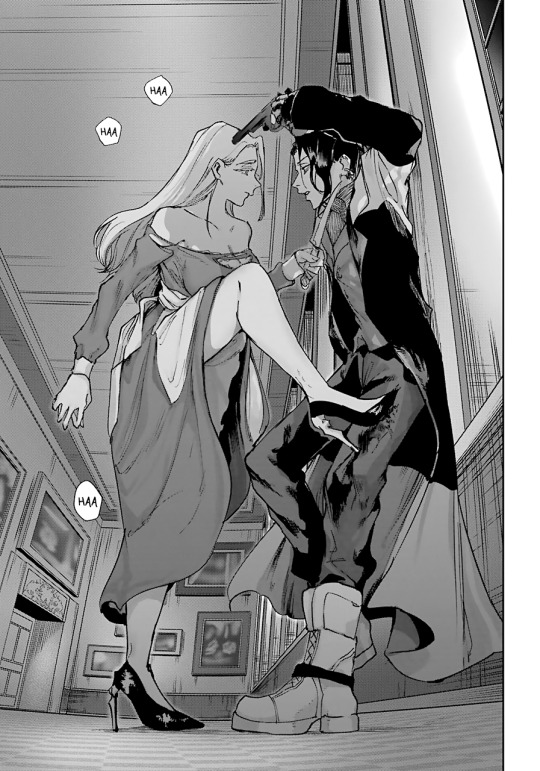
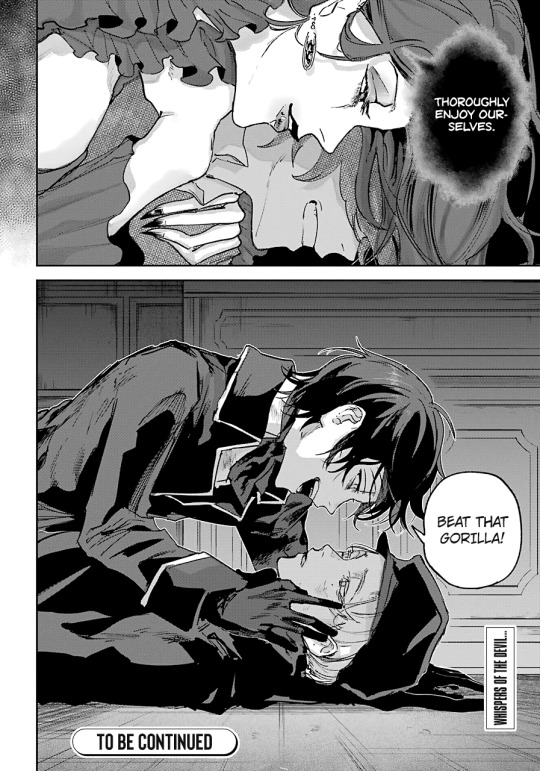
#i love this manga more than anything ong#read#from the red fog#right now.#manga#anime#rwanda#i dont remember anyone else's name#help#fangirlasf
144 notes
·
View notes
Text
TREVOR MOORE
The Whitest Kid You Know
As ringleader of The Whitest Kids U’ Know, Trevor Moore spent the last two years working a deliciously twisted flavor of humor into the palate of American comedy. When Hollywood handed him the keys to the big-screen machine this spring, he churned out Miss March—one of the most aggressively bizarre comedies in years. DJ Pangburn visited Los Angeles’s Griffith Observatory with Moore to explore otherworldly phenomena and seek out where the jokes come from.
By DJ Pangburn • Photos by Ray Lego • Styling by Carmel Lobello & Jill Breare
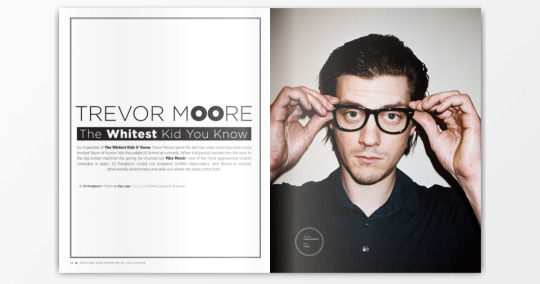
Trevor Moore and I are to meet at the Griffith Observatory in the evening. That’s what I’ve been told. As I walk towards the entrance, I notice a sticker on a sign that reads “Captain Gaylord.” In a place of public science, a bust of James Dean lords over the place. After all, this is Hollywood, and no public place would be complete without Dean’s brooding presence. The smog of Los Angeles is like a rainforest, and I wonder if it’s possible to observe anything in this sky. Pluto is no longer a planet, but the observatory is disregarding this astronomical ruling. Pluto still orbits the Sun out on the front lawn. Griffith J. Griffith was something of a madman, and the land he bequeathed to Los Angeles today still seems to suffer some otherworldly spell.
Trevor arrives wearing a Harley-Davidson jacket. But, as he will tell you, he does not have a bike and this confuses everyone he meets. After determining how much we weigh on each of the planets, we talk briefly about the masterpiece of nonsense that is Pootie Tang, which leads us straight down the absurdist trail to Freddie Got Fingered…
How do such movies make it through the Hollywood machine? Freddie Got Fingered is one of the most amazing feats ever!
[Tom Green] just had complete creative control over the thing. I enjoy watching it. But Pootie Tang—I remember I rented that in college and I watched it and thought, I don’t like that. But then I kept thinking about it the next day and telling people about it. So I watched it again, and it was a completely different movie. The second time I watched I was like, I love this movie.
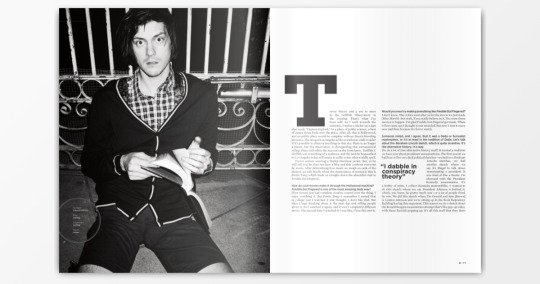
Would you ever try making something like Freddie Got Fingered?
I don’t know. The critics were after us for the movie we just made [Miss March]—but yeah, if you really believe in it. You want those movies to happen. I’m glad Freddie Got Fingered got made. When it first came out I thought it was retarded. But now I rent it every now and then because it’s fun to watch.
“I dabble in conspiracy theory”
Someone noted, and I agree, that it was a Dada or Surrealist masterpiece, or it’s at least in the tradition of Dada. Let’s talk about the Abraham Lincoln sketch, which is quite inventive. It’s like alternate history, in a way.
We do a lot of that alternate history stuff. It started a tradition we have now about presidents’ assassinations. The first season we had four or five very dark political sketches—we had two Abraham Lincoln sketches, we had another sketch where we say it’s illegal to talk about assassinating a president. It was kind of like a theme. I’m obsessed with the President Kennedy assassination. It’s a hobby of mine. I collect Kennedy memorabilia. I wanted to do this sketch where we say President Johnson is behind it, which, you know, he pretty much was—or a lot of people think he was. We did this sketch where I’m Oswald and Sam [Brown] is Lyndon Johnson and we’re sitting up in the Book Depository Building having this argument. This season we do a sketch about the Ronald Reagan assassination attempt that’s like pop-up video, with those factoids popping up. It’s all this stuff that they don’t talk about. Reagan did some good things, but he’s canonized now—as soon as he died he became this saint and historical figure. He did some good things but he also armed everybody that we’re fighting now. He got us in Rwanda.
“I’m obsessed with the President Kennedy assassination. It’s a hobby of mine.”
He armed the Contras.
He ignored AIDS for a decade and let it become a full-blown epidemic. So during this Reagan sketch, all these effects pop up with these odd facts—like, let’s slow our roll on this patron saint that is Ronald Reagan. But we’re kind of out of people now. [Laughs]
Were there any repercussions to the “It’s Illegal to Talk About Assassinating the President” sketch?
No. I checked it with my lawyer and he didn’t know. I was a little nervous about it, so I called the ACLU and they wouldn’t tell me if I could say it or not. I ended up asking them, “If I got in trouble for this, would you pick up the case?” They said, “Yeah.” But I still took part of it out. I don’t think I would have thought that sketch was as interesting or funny now. Most of the people my age that grew up during the Bush years hated him. He was our Nixon. If I came up with an idea like that during the Obama administration, I would be like, Eh, no, I don’t want to. And it’s not like you can’t make jokes with Obama, but he’s a different guy and there are different connotations.
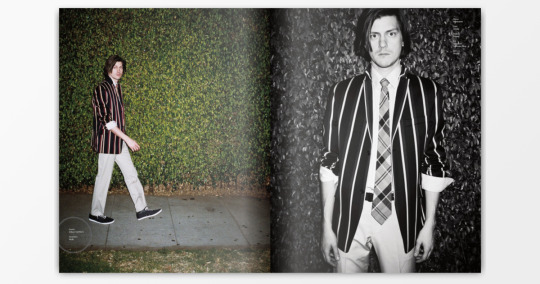
At this point a most horrific cacophony of dog cries erupts from the hills below. Trevor looks in the direction from which the noise is coming and says, “What is that?” I say, “Holy shit… it could be a cougar, or a snake.” Trevor jumps down from the ledge on which he had perched himself and states unequivocally, “We’ve gotta go look at this.” I’m not quite sure how he intends to get us down to the crying dogs, but I play along, “You really want to go down there?” Trevor nods, “We gotta go down there.” We descend the steps of the observatory and toward the melee down slope. “It’s like flying dogs in a bat swarm,” Trevor says of the noise, and I try to make sense of what flying dogs in a bat swarm might look like. We encounter a couple Armenians smoking cigarettes and Trevor asks their opinion on the matter. One replies, “Wolves.” they smile at us and then look back out to the horizon, smoking ravenously. It’s fairly clear we aren’t going to make any headway into the crying dog matter. So we continue with our interview.
What books or films were influential to your comedic style?
All the Kings Men was always a book I really liked. It’s about backroom politics and how everyone is corrupt. And about how good people who go into politics with the best intentions ultimately become what they hate. But my big influence was always Monty Python. I grew up in a very conservative house and I wasn’t allowed to watch Smurfs, because it had witchcraft and magic in it. I was able to watch Letterman, who was my other big influence. I’d set the VCR, when I was a little kid, to tape Letterman after Carson and I’d watch it when I got home from school the next day. Also, Weird Al. I think he was one of the first people where I realized that he’s a musician, but all he does are funny songs. Lord of the Flies, too. One of the few books I’ve read more than once. In high school I was really into Hunter Thompson. The book I really liked was called Better Than Sex, which really wasn’t one of his better books. It was about the 1992 election. It’s basically about him sitting in his apartment, watching all these different televisions and filing off faxes to people, telling them what they should do. All these people you’d see on TV, he would write a fax to them because he had everybody’s numbers. And because it’s Hunter S. Thompson, everybody writes him back. A lot of the book is just basically him sending off angry faxes to people and then responding.
When Nixon left office, Hunter S. Thompson no longer had the anti-human to attack. We no longer have Bush. For the comedian, how does that affect the work? I know there is never a loss for material, but when the politics have changed—
—Well I don’t think the politics change that much. All the guys behind the scenes are still there.
But when the face of it all isn’t so abrasive and devilish…
That’s when you’re really in trouble. [Laughs] The optimist in me wants to believe it’s different. [The Whitest Kids U Know] performed at benefits to send money to Obama. I was in Grant Park election night. I flew down to the inauguration and I was on the lawn. I was swept up in it, you know. At the same time, I still think it’s the same guys smoking cigars behind the scenes. It’s still the Bilderbergers. It’s still the World Bank.
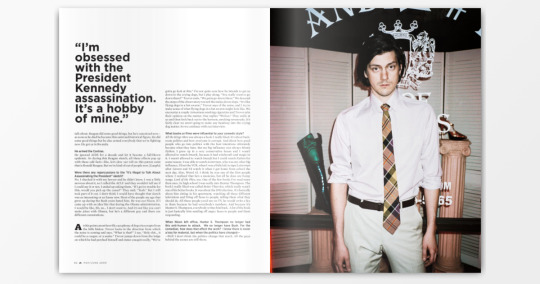
I read this book called Rule by Secrecy by Jim Marrs. And that’s where I was introduced to all those groups and theories, which came out by way of The Da Vinci Code. Ultimately, it led to aliens.
[Laughs] It usually does. I dabble in conspiracy theory. There’s a lot of it in our show because I’m very interested in it. I don’t believe all of it. But I think there’s truth in a lot of it. The problem with it is that the baby gets thrown out with the bathwater a lot. The CIA killed Kennedy. For me, all the evidence is there, or at least the reason for them to do it is there. The witnesses that died—you watch the Zapruder film, he didn’t get shot from the back. He got hit in the front!
Here’s a fact I can’t reconcile with anything: Oswald goes over to the Soviet Union… and he gets back into the United States? No way. How was he not thrown in a prison the minute he stepped foot on American soil?
Yeah—during the Red Scare. I don’t think that these people who are CIA are eventually not CIA. “Oswald was CIA a while ago, but not when he did that!” [Laughs] “Bin Laden was CIA a while back, but not when he did that!”
And you can’t prove anything because it’s the CIA, they can deny anything.
Yes! It’s the CIA! [Whispers covertly] That’s why we have to talk about this in wide-open spaces like this where there’s no microphone.
I tell him about a book called The Men Who Stare at Goats, which details New Age techniques adopted by highly placed U.S. Army intelligence officials in the seventies and early eighties. Officials who believed they could walk through walls, stare goats to death, achieve Jedi-like mental powers, astral project and remote view, amongst other select things. Moore mentions that he himself has tried to astral project.
Explain how you were going about astral projecting.
I used to work for an Asian television network and I was in charge of documentaries. I had this guy who was very into New Age and kind of out there. He talked about how he astral projected all the time, and he had crystals that protected him from the spirits that tried to get him. I was kind of into it for a while and trying to do it. It never really worked. It got to the point where I also talked to people who said they had done it, and some of the stories I kind of believed. I don’t know if I believe it now, but at the time it scared me a bit. The guy I co-wrote with for years was the voice for those commercials that would go, “SEGA!” And he swears he used to do it. But he went the wrong way and bad stuff happened. I’m not sure I want to go and mess around in that world.
You might not make it back! [Laughs]
Right, yeah! I was also doing a documentary-comedy show. I did a pilot for the Asian network. We’d take a topic and make sketches about it, but then also look into it, investigate it. We were doing alien abductions, and we got interviews with people who had been abducted by aliens. These were people abducted by aliens in famous cases. The most absurd alien abduction on American soil—I got an interview with that woman. By the end of that interview I was like, I don’t think alien abductions are real. Then there’s neurolingustic programming…
Which is?
Ever heard of The Game? That book where guys go around hitting on girls?
Yes, the book by Neil Strauss.
That is a lot of neurologistic programming, in those methods. It was a big fad in the seventies. All the books are out of print, though. But it’s a fascinating, weird, almost dark art.
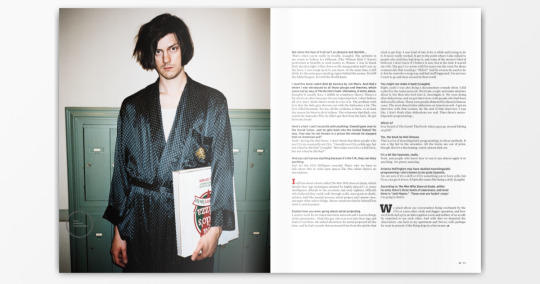
It’s a bit like hypnosis, really.
Yeah, and people who know how to use it can almost apply it to anything. It’s pretty amazing.
Arianna Huffington may have studied neurolinguistic programming—she’s known to be quite hypnotic.
I’m not sure if it’s a skill or if it’s something you’re born with, but if you can get it down, it basically seems like being a Jedi. [Laughs]
According to The Men Who Stare at Goats, within the army there’s three levels of awareness, and level three is “Jedi Master.” These men are fuckin’ crazy!
I’m going to find it.
We joked about our conversation being overheard by the CIA or some other cloak and dagger operation, and how we’d both end up in an interrogation room and neither of us would be surprised to see each other. And with that we departed the observatory—me back to my apartment and Trevor, well, perhaps he went in pursuit of the flying dogs in a bat swarm. ⇼
__________
This article appeared in Issue 19 of Death+Taxes, published on April 8, 2009. Death+Taxes (2008-2010) is a defunct music and men's lifestyle print magazine; it relaunched as a website in 2010 and was eventually acquired by SpinMedia in 2014, where it remains a culture and politics vertical of Spin.
Text and spread screenshots taken from Issuu.
#trevor moore#the whitest kids u know#wkuk#death+taxes#magazine#digital archives#april 8 2009#archive#death and taxes#death and taxes issue 19#2009
27 notes
·
View notes
Text
A speech by HRH The Duchess of Cornwall at a Violence Against Women and Girls Event at the Kigali Convention Centre, Rwanda
Ladies and Gentlemen, it is a huge pleasure to be here with you today. I should, first, like to thank the people of Rwanda for the wonderful welcome that my husband and I have received. I have heard the saying, “God spends the day elsewhere, but he always spends the night in Rwanda” – and, having seen a little of this beautiful country and experienced your hospitality, I can quite understand why that might be the case… Thank you for your kindness and generosity to us and to the whole Commonwealth family – we were all so sorry not to be able to gather here over the past two years and are delighted that we are now, finally, together.
Yesterday, my husband and I visited the Kigali Genocide Memorial: the final resting place for more than a quarter of a million men, women and children. Our guide, who had lost both his parents in the Genocide against the Tutsi, spoke to us of how, in the wake of those appalling, unfathomable events, the people of Rwanda have embraced peace and reconciliation. And he described, with gentleness and humility, how we all have a personal responsibility to fight the discrimination and ideologies that lead to the destruction of others. It is in that same spirit of encouraging personal responsibility that I wish to speak today about a different evil that has led to the death of many thousands: violence against women and girls.
The figures are shocking. Globally, nearly 1 in 3 women have been abused in their lifetime. In times of crisis, the numbers rise, as they have, dramatically, during the Covid-19 pandemic. Across the Commonwealth, calls to domestic violence helplines have increased by up to 500% over the past two years. Whether we are aware of it or not, we all know someone who has endured sexual or domestic abuse. We can, therefore, all be part of combatting these heinous acts.
On International Women’s Day earlier this year, I was profoundly touched by President Kagame’s powerful message on social media, which read, “Equality is a right, not a favour”. We know that Rwanda is ranked 7th in the world in terms of women’s rights and opportunities. So let us bear His Excellency’s words in mind as we focus on violence in the home against women and girls today and remember that we are seeking rights, not favours.
We are seeking rights that have been denied to women and girls in every part of the world: Joanna Simpson in the UK, beaten to death by her husband while their two small children were in the next room; Noreen in Pakistan, whose husband, a drug addict, routinely abused her and alternately threw her out of the house or forbade her to go outside; and Uwaila Vera Omozuwa, murdered in Nigeria as she studied in church.
These stories are heart-breaking. But, given the statistics I have just quoted, they are, sadly, not unusual.
Ladies and gentlemen, we are gathered here with one purpose - to find solutions. It is surely significant that every single member state has unanimously agreed to support the “Commonwealth Says NO MORE” campaign and to implement initiatives to prevent domestic violence and sexual abuse.
There is power in this alliance. In the strength of our unity, we, the women and men of the Commonwealth, stand with victims and survivors, who, despite the temptation to hide away in silence, speak up so that others know they aren’t alone – whether in Africa, Asia, Europe, the Pacific or the Caribbean and Americas. In so doing, we have the opportunity to end gender-based violence and those laws and practices that discriminate against women. And each one of us must take personal responsibility not to let this opportunity be lost.
I should like to close by quoting from a speech given 75 years ago by my mother-in-law, The Queen, in Cape Town. As we work together, let us be inspired by Her Majesty’s words, her example and her deep love for the Commonwealth, which, in 2009, Rwanda joined as a new partner and friend.
"If we all go forward together with an unwavering faith, a high courage, and a quiet heart, we shall be able to make of this ancient Commonwealth, which we all love so dearly, an even grander thing - more free, more prosperous, more happy and a more powerful influence for good in the world."
Thank you.
83 notes
·
View notes